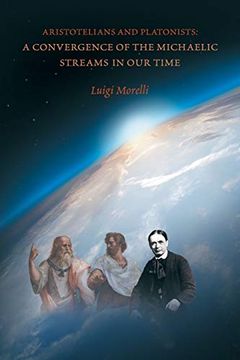Share
Aristotelians and Platonists: A Convergence of the Michaelic Streams in our Time (in English)
Luigi Morelli (Author)
·
Iuniverse
· Paperback
Aristotelians and Platonists: A Convergence of the Michaelic Streams in our Time (in English) - Luigi Morelli
$ 18.17
$ 25.95
You save: $ 7.79
Choose the list to add your product or create one New List
✓ Product added successfully to the Wishlist.
Go to My WishlistsIt will be shipped from our warehouse between
Tuesday, May 07 and
Wednesday, May 08.
You will receive it anywhere in United States between 1 and 3 business days after shipment.
Synopsis "Aristotelians and Platonists: A Convergence of the Michaelic Streams in our Time (in English)"
At the heart of this book is Rudolf Steiner's "culmination in the twentieth century," or the convergence of the working of Aristotelians and Platonists for the renewal of culture. And questions arise. Where is the whole of the School of Michael at present? How can we characterize and honor one and the other stream, and avoid stereotypes and misunderstandings? This work approaches the matter in its historical unfolding, in three successive steps, in which Steiner/Aristotle's and Plato/Schröer's incarnations form a thread. The first tableau opens up in the previous Age of Michael, in Greece, when Plato and Aristotle inaugurated the work of the two Michaelic streams. The second addresses the Middle Ages, and centers around the contrast between Alain de Lille and Thomas Aquinas, between the School of Chartres and Scholasticism. Steiner's and Schröer's life tasks in the nineteenth century form the prelude to the present. The heart of the book, and its longest section, looks at the present. It contrasts the working of Aristotelians and Platonists in the natural sciences, in psychology and in the social sciences. From the ground of extensive observation and characterization, it then turns to pressing questions. What can Platonists learn from Aristotelians? And how about the reverse? Starting from the example of individuals meeting across the streams, how can we extend this understanding so that it becomes an ongoing practice and a cultural concern? How can Michaelic individuals and institutions work in ways that honor the whole of the Michaelic movement?
- 0% (0)
- 0% (0)
- 0% (0)
- 0% (0)
- 0% (0)
All books in our catalog are Original.
The book is written in English.
The binding of this edition is Paperback.
✓ Producto agregado correctamente al carro, Ir a Pagar.

